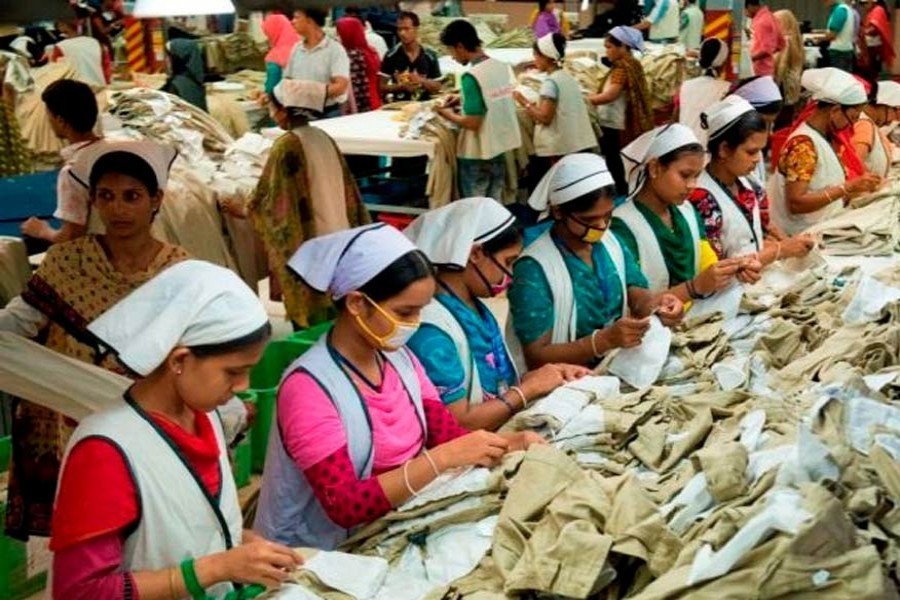Following the Rana Plaza building collapse in 2013, the country's readymade garment (RMG) industry experienced a huge watershed in workplace safety and factory remediation. Thanks to the remediation process that took more than four years to bring this remarkable change. Although there has been controversy over the remediation process that involved substantial investments on the part of the factory owners, the fact remains that the European and North American buyers' platform Accord and Alliance which looked after the entire process for so long has done a good job in collaboration with the factory owners and the government.
The country is currently well ahead of some of its formidable competitors in its attainments of workplace safety. This has been reported by AsiaInspection in its first quarterly report of 2018 released recently. The Hong Kong-based inspection body which is also a leading global quality control and compliance service provider that partners with brands, retailers and importers around the world has placed Bangladesh ahead of India and China in its assessment of workplace conditions in the apparel sector. Beside workplace safety, Bangladesh has advanced 15 per cent over a period of one year in ethical scores.
Despite the laudable achievement, it has been found that these improvements have very little or no bearing on the overall RMG business model. Bangladesh readymade garment supply chain still suffers from lack of 'shared responsibility' on the part of global buyers although transparency of the buyers and working condition in the country's RMG factories have improved, according to a global report.
The Germany-based Garment Supply Chain Governance Project conducted a survey on 152 managers and 1,500 workers of export-oriented RMG factories in Bangladesh and found that the fundamental business model in the garment supply chain has not changed.
According to the report titled 'Changes in the Governance of Garment Global Production Networks: Lead Firm, Supplier and Institutional Responses to the Rana Plaza Disaster', Bangladeshi suppliers are facing difficulties in meeting the demands of global buyers due to lack of shared responsibility. "We observe a stronger concern for worker's safety and labour standards on the one hand and continued tensions between buyers' demands for low production costs and speed on the other,' the report said.
The project presents the perspectives of lead firms based in different home countries, suppliers and workers in the context of ongoing institutional improvements/ changes in Bangladesh garment industry and those at transnational levels. "The fundamental business model in garment supply chains is not changing. A large proportion of production for brands and retailers in higher wage countries is being conducted in low-wage countries. Garment production remains an industry with high levels of opportunity for countries to connect to global value chains, but this comes at a price for workers," according to the key findings of the report.
The report also unfolded its findings on the behaviour of top 10 large global garment buyers in five countries-- Australia, Germany, Sweden, the UK and the US, and found they are experimenting with a variety of new approaches for managing labour standards that reach beyond the compliance model of auditing. Many brands and retailers have adopted rigorous policies related to quality and labour standards which have increased the costs of working with new suppliers, it added. "Factory managers now realise that non-compliance threatens the ability to export to Europe and the US," the report said. "Our key finding is that working condition in the Bangladesh garment industry has improved since Rana Plaza. Although precise causal attribution is difficult, this effect is stronger at larger factories, and firms affiliated to Accord and Alliance perform better across all factory sizes," the report observed.
Better working conditions and wages at Accord and Alliance factories might in part be a positive spill-over from the rigorous enforcement experienced when buyers collaborated to ensure that suppliers have 'no choice' but to comply with, factory managers said during the survey.
The survey found some labour rights abuses, such as forced overtime, low wages reflecting an unchanged business model in the industry. It said fast changing fashions that involved production requiring quick turnaround at low prices were expanding. The fast fashion model often involves production taking place in facilities with weak labour regulation and businesses working under high levels of pressure to remain globally competitive.
It is thus not argued that beside factory remediation in Bangladesh apparel industry, the steps taken in recent times through enacting labour law, setting minimum wage etc have not helped the industry to address the appropriate needs. These critical areas -- wage, unionism and labour standard -- need to be further worked on by the industry and the government. A good deal depends on how the business model can be rendered more befitting with the shared responsibility of all stakeholders including global apparel brands and buyers.


